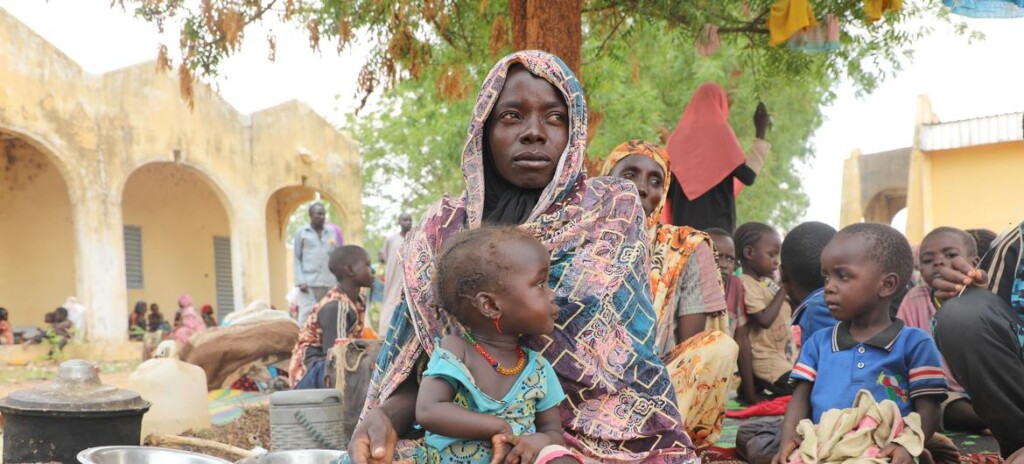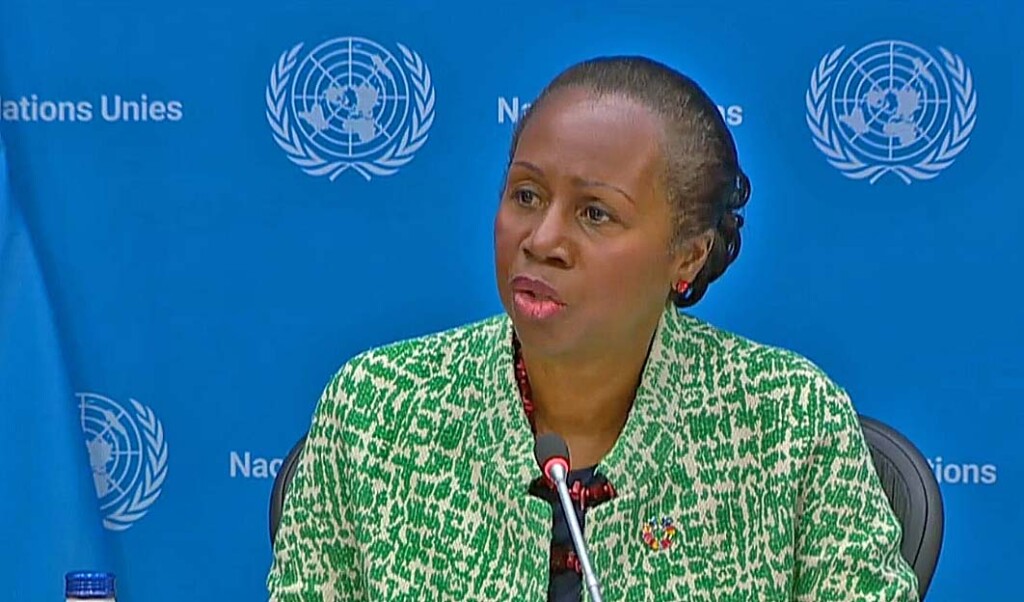UN Humanitarian coordinator calls on world leaders “to step up to end the devastating conflict in Sudan”

Mariam Djimé Adam, 33, with her eight children, in the yard of Adre’s secondary school in Chad, after fleeing the war in Sudan. "We were attacked in our home, my husband was killed and all our belongings were taken. I managed to escape with my children.." (File photo: © UNICEF / Mahamat)
As world leaders gather for the United Nations General Assembly in New York, UN Resident and Humanitarian Coordinator in Sudan Clementine Nkweta-Salami has urged member states and the international community to focus on the plight of millions of people in Sudan who have endured more than 17 months of brutal conflict, which has resulted in the world’s fastest-growing civilian displacement and humanitarian crisis.
World leaders are gathering in New York today (Tuesday, 24 September to Saturday, 28 September, and on Monday, 30 September) to engage in the annual high-level General Debate of the UN General Assembly under the theme, “Leaving no one behind: acting together for the advancement of peace, sustainable development and human dignity for present and future generations”. The debate is the conclusion of the 79th session of the UN General Assembly (UNGA 79), which began on 10 September.

“Humanitarians across Sudan are calling on the international community to step up to end the devastating conflict and ensure unrestricted access so that more than 150 aid organisations operating in the country can reach the millions of people facing acute hunger and disease – and staring down famine,” Nkweta-Salami says in a statement today.
The crisis in Sudan and the region will take centre stage at UN Headquarters on Wednesday, 25 September, when Member States join together with the UN Office for the Coordination of Humanitarian Affairs (OCHA) and the UN Refugee Agency, to call for urgent and collective support to address the humanitarian catastrophe and push for peace.
‘This is exactly why the UN was created: to prevent war and alleviate human suffering…’
“This is exactly why the UN was created: to prevent war and alleviate human suffering,” the Humanitarian Coordinator added. “Each passing hour means women and children in parts of El Fasher, Khartoum, El Gezira, Sennar and other areas directly affected by conflict are likely dying from hostilities, malnutrition, or illness.”
Since the conflict erupted between the Sudanese Armed Forces (SAF) and the Rapid Support Forces (RSF) in April 2023, an estimated 20,000 people have been killed and thousands of others injured. More than 10 million people – or over one in every five people – have fled their homes, including 8.1 million who have been displaced within Sudan and another 2.4 million who crossed the borders to neighbouring and other countries.
In recent days, at least 1,500 people were displaced from El Fasher, capital of North Darfur State following the escalation of hostilities in the town. “Once again, I urge the parties to halt attacks on civilians, homes and essential facilities, such as hospitals, which are protected under the international humanitarian law,” Nkweta-Salami says.
The situation in and around El Fasher is of particular concern, after the Famine Review Committee of the Integrated Food Security Phase Classification confirmed famine conditions in the Zamzam displacement camp in August. Another 13 areas, including two other displacement camps in North Darfur, are likely experiencing similar conditions and need urgent access and assistance.
Meanwhile, the outbreak of cholera and incidences of water or vector-borne diseases are aggravating the already dire situation that malnourished people, especially children and women, are facing. According to the Sudanese authorities, the number of cholera cases reported over the past two months has reached 13,300, including 415 related deaths.
‘Unrestricted access and additional funding are critical to reach more people in acute need…’
Despite insecurity, access and funding challenges, humanitarian partners provided more than 8 million people across Sudan with some form of humanitarian assistance this year. Over the past week, humanitarian organizations started distributing emergency food aid for about 180,000 people in Zamzam camp.
Meanwhile, following the re-opening of the Adré border point between Chad and Sudan, UN aid agencies have moved 135 trucks with essential life-saving supplies for about 520,000 people via the crossing. “The aid through Adré and food for people in Zamzam camp, where famine has been confirmed, are a testament to what the UN and humanitarian partners can accomplish,” the Humanitarian Coordinator said. “However, unrestricted access and additional funding are critical to reach more people in acute need.”
Nine months into the year, the Sudan humanitarian appeal, seeking $2.7 billion, is less than 50 per cent funded. This is constraining and limiting the response efforts of the UN, international and national NGOs on the ground, including in Darfur, Khartoum, Kordofan and other areas, Nkweta-Salami concludes.











 and then
and then